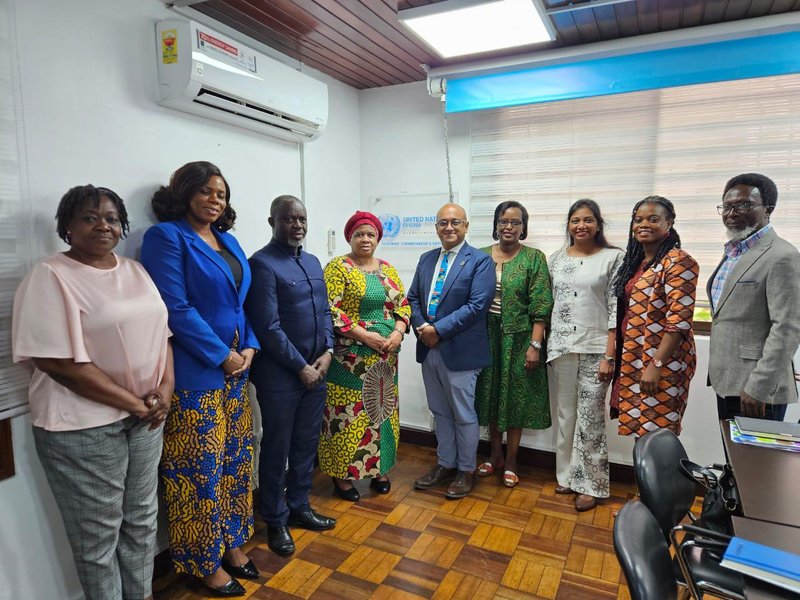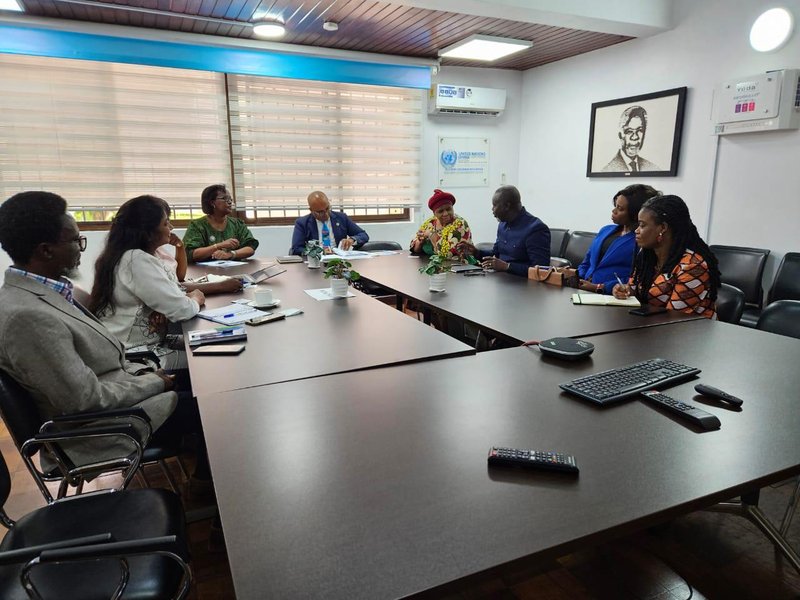WMO Delegation Meets New UN Resident Coordinator for Ghana

On July 25, 2025, in a significant diplomatic engagement, the Director for the World Meteorological Organization (WMO) Regional Office for Africa Dr. Agnes Lawrence Kijazi paid a courtesy visit to the United Nations Resident Coordinator (UNRC) for Ghana, Mr. Zai Choudhury, to formally introduce the Director General of the Ghana Meteorological Agency (GMet) and the Permanent Representative of Ghana with WMO in Ghana Dr. Eric Asuman. The engagement also focused on GMet as the representative of WMO in Ghana could give supports to UN Country Team (UNCT) in strengthening inter-agency collaboration around early warning systems and disaster preparedness in Ghana.
The high-level meeting was held at the UN Resident Coordinator’s office in Accra, bringing together key representatives from the UNRC, the World Food Programme (WFP), WMO and the Ghana Meteorological Agency (GMet). Attendees from the UNRC were the Resident Coordinator Mr. Zai Choudhury and the Rep. for Data and Management Reporting Mrs. Myra Togobo.
WFP Country Director Mrs. Aurora Rusiga, Deputy Country Director Anitha Narahari, and Head of Technology & Early Warning Coordinator Patrick Enya.
Director for the WMO Regional Office for Africa Dr. Agnes Lawrence Kijazi,
From GMet, participants were Director-General; Dr. Eric Asuman, Acting Deputy Director-General for Support Services Mrs. Vivian Abla Kaly, Principal Meteorologist & External Relations Officer, Ms. Maureen Abla Ahiataku, and Assistant Public Relations Officer Mr. Theodore Coffie.
Significance of the Visit
Mr. Zai Choudhury, who is just three weeks into his role, expressed appreciation for the visit, describing it as opportune. Drawing on his extensive experience in international development and humanitarian affairs, he reaffirmed the critical role of timely meteorological information in saving lives and supporting sustainable development.
The UNRC also confirmed receiving the official document of the validated and endorsed roadmap for the Early Warning for All initiative which he will review and offer support to achieve the objectives of the initiative.
Dr. Kijazi emphasized WMO’s pivotal role in supporting national governments through their National Meteorological and Hydrological Services (NMHSs) as they represent WMO at the national level and serve as the authoritative voice on Weather, Water and Climate issues and warnings. She underscored the importance of inter-agency partnerships, especially between meteorological agencies and UN entities, to enhance early warning capabilities.
Ghana’s Commitment to Climate Resilience
Dr. Asuman provided a comprehensive update on Ghana’s progress in implementing the Early Warnings for All (EW4All) initiative. He reported that a national roadmap has been validated and endorsed, and a governance framework has been established with strong backing from the government.
Dr. Asuman reaffirmed the government’s commitment to strengthening the country’s early warning systems, emphasizing it as a clear demonstration of readiness to support the EW4All initiative. He outlined specific governmental support directed at the Ghana Meteorological Agency (GMet) and the National Communications Authority (NCA), which serve as Pillars 2 and 3 of the EW4All framework.
Key developments include proposed amendments to the GMet and the NCA enabling Acts, the retooling of GMet, and enhanced revenue mobilization from aviation services. He identified the implementation of the Common Alerting Protocol (CAP) as a strategic priority for the year. Furthermore, Dr. Asuman announced the formation of the Governing Board of the National Early Warning System, composed of ministers representing the national pillars, to ensure coordinated and effective early warning and crisis response mechanisms.
Dr. Kijazi lauded these efforts, highlighting her discussions with Ghana’s Minister for Communication, Digital Technology, and Innovation, which further demonstrated the country’s political will for strengthen early warning system (EWS) and the close collaboration with WFP and GMet is worth sharing with other countries.
WFP: Linking Climate to Food Security
Mrs. Aurora Rusiga, the WFP Country Director, welcomed the high-level meeting as timely and crucial. She emphasized the need for collaborative efforts to address climate issues, food security, and the accessibility of climate services. She acknowledged that GMet's expertise and infrastructure would significantly support WFP's activities, aligning with the Government of Ghana's strong interest in transforming its food systems. Mrs. Rusiga highlighted that climate mitigation can contribute to addressing hunger and poverty while creating employment opportunities for youth, underscoring the need to enhance the necessary infrastructure to support these efforts.
Anitha Narahari, the Deputy Director of WFP, expressed satisfaction with the coordination and commitment demonstrated by the national pillars towards the EW4All initiative, with WFP's support. She noted that this reflects the government's strong dedication to advancing the initiative.
WFP’s Deputy Country Director confirmed the strength of the collaboration. “Our coordination with national pillars is yielding results,” she said. “Two joint proposals with GMet are already in development, and we’re optimistic about their impact.”
A Roadmap for the Future
The meeting concluded with a shared commitment to advancing early warning capabilities through specific next steps:
UN Inter-Agency Working Group: GMet will be integrated into the working group and actively participate for mutual benefit and improved coordination for GMet and the UNCT.
WMO–UNRC Partnership: A joint review will identify actionable programs to scale the EW4All initiative.
AI for Climate Data: WFP and GMet will explore the use of Artificial Intelligence to lower costs and improve the precision of climate forecasting.
Strengthen collaboration with National Statistical Service and integrate data from National Statistical Service into EW4All products and services.
Operational Priorities: Upcoming activities such as CAP implementation, national awareness campaigns, and the development of Impact-Based Forecasting systems will be prioritized.
These initiatives, collectively, are expected to significantly reduce disaster-related impacts and strengthen national resilience.
Conclusion
The meeting marked more than a courtesy call and introduction of the PR to UNRC; it was a reaffirmation of Ghana’s leadership on climate resilience and the UN system’s collective commitment to support the EW4All initiative ensuring no one is left behind in the face of escalating climate risks. With Ghana’s strong political will in strengthening national and international partnerships, and robust institutional frameworks, the path toward multi-hazard EWS early warning coverage is firmly underway.

©️GMet Communications

